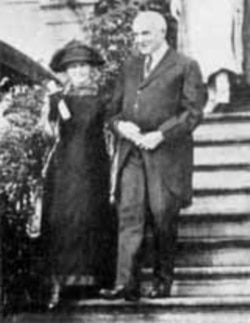Or download MP3 (Right-click or option-click and save link)
Read and listen to the article. Then open the activities on the right side of the page to improve your English!
The years after World War One were an important turning point in the making of the American nation. The country turned away from the problems of Europe. Now it would deal with problems of its own.
There was a presidential election in America in nineteen twenty. President Woodrow Wilson was not a candidate. He had suffered a stroke and was too sick. The two major candidates were Democrat James Cox and Republican Warren Harding. Voters had a clear choice between the two candidates.
Cox supported the ideas of President Wilson. He believed the United States should take an active part in world affairs. Harding opposed the idea of internationalism. He believed the United States should worry only about events within its own borders.
Warren Harding won the election. By their votes, Americans made clear they were tired of sacrificing lives and money to solve other people's problems. They just wanted to live their own lives and make their own country a better place.
This was a great change in the nation's thinking. For twenty years, since the beginning of the century, the United States had become more involved in international events.
Young Americans had grown up with presidents like Woodrow Wilson and Theodore Roosevelt. Both Wilson and Roosevelt had active foreign policies. Both helped start the nation on the road to becoming a major world power.
Then came World War One. It was like a sharp needle that bursts a balloon. The United States and the Allies won the war against Germany and the Central Powers. But thousands of American troops had died in the European conflict. And many months were taken up by the bitter debate over the peace treaty and the League of Nations.
Most Americans did not want to hear about Europe and international peace organizations any more.
Instead, Americans became more concerned with material things. During World War One, they had lived under many kinds of restrictions. The federal government had controlled railroads, shipping, and industrial production. At the end of the war, these controls were lifted. Industries that had been making war supplies began making products for a peacetime economy.
Wages for most workers in the United States were higher than ever at the beginning of the nineteen twenties. Men and women had enough money to enjoy life more than they had in the past.
Technology made it possible for millions of people to improve their lives. It also caused great changes in American society. Two of the most important new technologies were automobiles and radio.
In the early years of the twentieth century, automobiles were very costly. Each one was built separately by a small team of skilled workers. Most Americans did not have the money to own an automobile.
Then Henry Ford decided to make cars everyone could buy. He built them on an assembly line. Cars were put together, or assembled, as they moved slowly through the factory. Each worker did just one thing to the car before it moved on to the next worker. In this way, the Ford Motor Company could build cars more quickly and easily. And it could sell them for much less money.
Before long, there were cars everywhere. All these cars created a need for better roads. Outside cities, most roads were made just of dirt. They were chokingly dusty in dry weather and impassably muddy in the rain.
They were rough and full of holes. Few bridges connected roads across rivers and streams. America's new drivers demanded that these problems be fixed. So, local and state governments began building and improving roads as they had never done before.
Cars also made life on farms less lonely. It became much easier for farm families to go to town on business or to visit friends. Cars helped Americans learn more about their nation.
Not all the changes linked to the car were good, of course. Automobile accidents became more common and deadly. Other forms of transportation, such as railroads, began to suffer from the competition. Some railroads had to close down. Horses and wagons -- once the most common form of transportation -- began to disappear from city streets.





